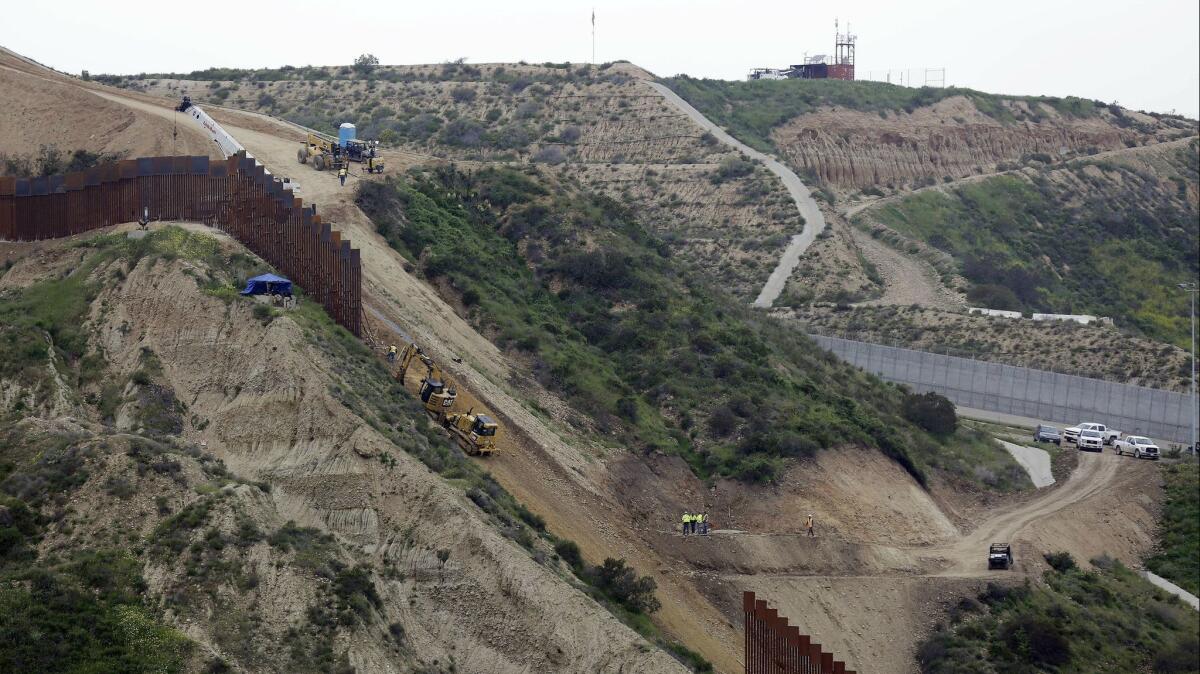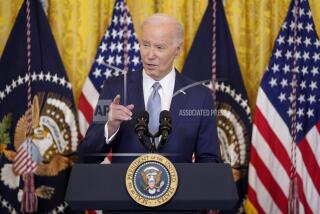Federal judge in California halts Trump’s plan to build parts of border wall

A federal judge in California has blocked President Trump from building sections of his border wall using money redirected through a national emergency declaration.
U.S. District Judge Haywood S. Gilliam Jr. on Friday immediately halted the administration’s efforts to divert military funds for use in wall construction, granting a preliminary injunction sought by the Sierra Club and a coalition of border community groups that sued the administration.
Critics had objected to the Trump administration’s move, saying it overstepped its authority by funneling billions of dollars toward the president’s signature campaign promise without authorization from Congress.
The preliminary injunction applies to two planned projects to add 51 miles of fence on two areas on the Mexican border in El Paso and Yuma, Ariz., scheduled to begin as soon as Saturday. The decision prevents federal officials from “taking any action to construct a border barrier in the areas.”
In granting the preliminary injunction to stop the work, Gilliam cited Congress’ “absolute” control over federal expenditures under the Constitution, “even when that control may frustrate the desires of the executive branch regarding initiatives it views as important.”
“The position that when Congress declines the executive’s request to appropriate funds, the executive nonetheless may simply find a way to spend those funds ‘without Congress’ does not square with fundamental separation of powers principles dating back to the earliest days of our Republic,” Gilliam wrote.
Gilliam is overseeing two cases that involve Trump’s controversial decision to bypass Congress to pay for his long-promised wall, a centerpiece of his 2016 campaign. The other is a lawsuit brought by California and 19 other states.
Trump declared a national emergency in February after losing a fight with the Democratic-led House over fully paying for the wall that led to a 35-day government shutdown.
Congress set aside $1.375 billion to extend or replace existing barriers in Texas’ Rio Grande Valley. But Trump wanted to spend $8 billion on wall construction, so he declared the emergency to siphon money from other government accounts.
A White House memo identified three funding sources: $3.6 billion from military construction funds, $2.5 billion from Defense Department counter-drug activities and $600 million from the Treasury Department’s asset forfeiture fund.
The White House did not immediately respond to a request for comment Friday.
The judge’s decision cited comments from the president and others in his administration in which they indicated that if they didn’t obtain Trump’s desired level of wall funding from Congress, they would use other measures to obtain it “one way or another.”
Along with remarks from Trump, Gilliam’s ruling quoted a Fox News interview with acting White House Chief of Staff Mick Mulvaney, in which he said the wall “is going to get built, with or without Congress.”
The administration has said its actions are needed to protect national security amid a surge of Central American migrants seeking asylum at the U.S. border.
Trump’s Feb. 15 national emergency declaration said “the current situation at the southern border presents a border security and humanitarian crisis that threatens core national security interests,” adding that “the southern border is a major entry point for criminals, gang members and illicit narcotics.”
But opponents of the administration said the president’s action was an illegal maneuver to spend more money than Congress authorized.
“This order is a win for our system of checks and balances, the rule of law and border communities,” said Dror Ladin, an attorney with the ACLU’s National Security Project, who argued the case on behalf of the Sierra Club and the Southern Border Communities Coalition.
“The court blocked all the wall projects currently slated for immediate construction,” Ladin said. “If the administration begins illegally diverting additional military funds, we’ll be back in court to block that as well.”
California Atty. Gen. Xavier Becerra welcomed the decision “barring President Trump from building a border wall in defiance of Congress’ power of the purse,” calling it a “critical victory for our states and communities.”
“America should be building bridges — not walls,” Gov. Gavin Newsom said. “The federal government should be focused on the real threats our state faces like wildfires and drug trafficking.”
The judge’s ruling did not address the merits of the wall itself.
Gilliam wrote that “the case is not about whether the challenged border barrier construction plan is wise or unwise. It is not about whether the plan is the right or wrong policy response to existing conditions at the southern border of the United States.”
“Instead, this case presents strictly legal questions regarding whether the proposed plan for funding border barrier construction exceeds the executive branch’s lawful authority under the Constitution and a number of statutes duly enacted by Congress.”
The Associated Press contributed to this report.
More to Read
Sign up for Essential California
The most important California stories and recommendations in your inbox every morning.
You may occasionally receive promotional content from the Los Angeles Times.











